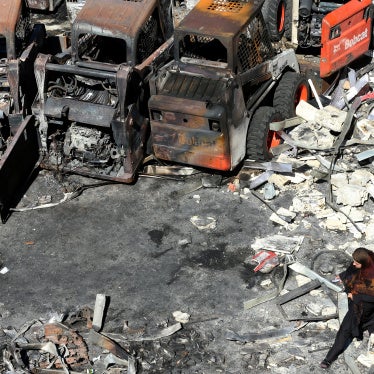Human Rights Watch today condemned the harsh prison sentence handed down this week against Riad al-Seif, a 55-year-old independent parliamentarian. He was the second elected member of Syria's parliament in less than a month to get a five-year prison term for advocating democratic change.
Syria has effectively declared war on its peaceful political critics, said Hanny Megally, executive director of the Middle East and North Africa Division of Human Rights Watch. “These sentences are clearly designed to punish and intimidate all advocates of democratic political change in Syria.”
On April 4, the Damascus criminal court found Seif guilty of attempting “to change the Syrian constitution by illegal means.” On March 20, the same court sentenced Mamoun al-Homsi, another outspoken member of parliament who had criticized the government of President Bashar al-Asad, to five years in prison on similar charges. Homsi was arrested in August 2001, al-Seif in September 2001.
Both parliamentarians had openly criticized of Syria's closed political system, dominated by the ruling Bath party, and advocated democratic reforms. Following the death of former president Hafez al-Asad in June 2000, Seif organized a freewheeling discussion group at his home until February 2001, when the government clamped down on these increasingly popular civic forums. Unable to obtain official permission for the continued operation of his group, Seif defiantly revived it in September 2001 and was promptly arrested. Following his arrest, seven other civic forum activists were also detained and remain in prison awaiting trial.
“This is the same pattern of repression of free expression that prevailed under former president Hafez al-Asad,” Megally said. “The new twist is using the civilian judiciary to deliver these deplorable verdicts.”
In the 1980s, Syria rounded up thousands of peaceful political activists and held them in long-term detention without charge or trial. In the 1990s, hundreds of political activists were prosecuted in the exceptional state security court, and typically sentenced to prison terms of five to ten years.
“The sentences imposed on Seif and Homsi do not augur well for the fate of the other activists,” Megally added. “Those cases have been referred to the state security court, and we fear their sentences could be even more severe.”
The procedures of the state security court -- whose decisions cannot be appealed -- do not comply with internationally recognized fair trial standards.
The eight other prisoners, all arrested in September 2001, include one of Syria's most prominent political opposition figures, Riad al-Turk, head of the unauthorized Communist Party-Political Bureau, who is in his seventies and was imprisoned without charge from 1980 to 1998.
Also awaiting trial before the state security court is economics professor Aref Dalila, a founding member of the Committees for the Revival of Civil Society. The other six detainees were active in civil forums and human rights groups: physician Walid al-Buni, lawyer Habib Issa (a participant in Homsi's and Seif's legal defense teams), physician Kamal Labouani, engineer Fawwaz Tello, Habib Saleh, and Hassan Saadoun.
Human Rights Watch called on the European Union and the United States to use diplomatic and other leverage to press for the immediate and unconditional release of the two parliamentarians and the eight still awaiting trial.
Syria is a party to the International Covenant on Civil and Political Rights, which guarantees freedom of expression, association, and assembly.








